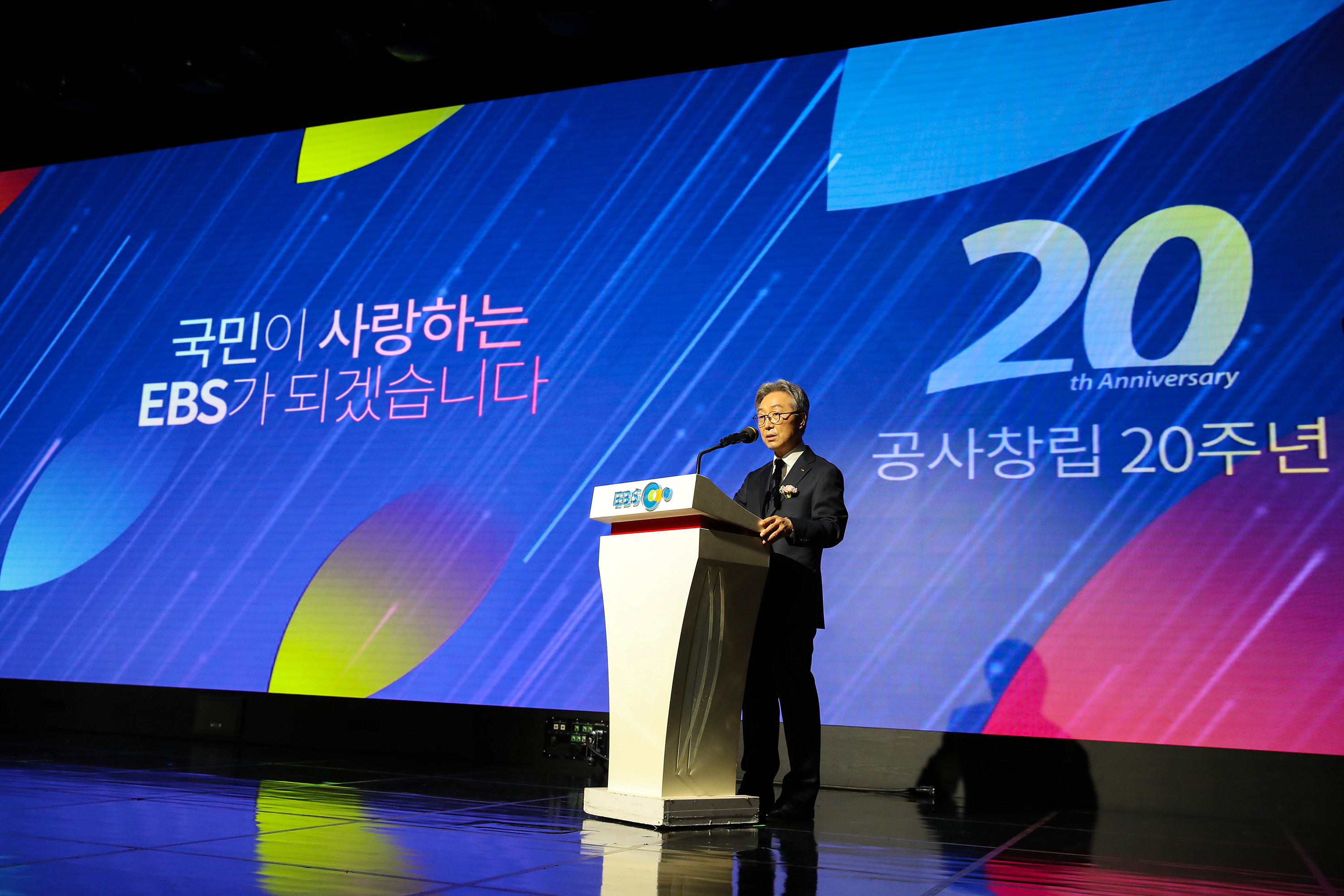News
EBS – Working to be trusted and loved by the nation, Event held to celebrate the 20th anniversary of the establishment of EBS as a public corporation
- Date
- 2020-08-10
- Hit
- 8618

- The morning of June 19th (Fri),
anniversary celebration held at the EBS headquarters’ Space Hall
- June 22nd, 20 years since being established as a public corporation and 46 years since its founding,
- EBS always strives to be trusted and loved by the nation
EBS (CEO Kim Myung-joong) held an anniversary
celebration at 11 a.m. on June 19th at the EBS headquarters
(Space Hall) in Goyang City ahead of the 20th anniversary of the
establishment of EBS as a public corporation on June 22nd.
Congratulatory video messages were sent by
President Moon Jae-in, Deputy Prime Minister for Social Affairs and Education
Minister Yoo Eun-hae, as well as the Minister of Science and ICT, Choi
Ki-young. EBS chief Kim Myung-joong, Korea Communications Commission chairman
Han Sang-hyuk, and Democratic Party of Korea members Lee Yong-woo (Goyang D),
Han Jun-ho (Goyang B) and Hong Jung-min (Goyang C) were in attendance.
In his
congratulatory message, President Moon Jae-in said, "EBS set up online
classes and worked hard to make sure that our students did not fall behind in
their studies. Teachers also conducted live-stream classes for all grades,
which was a first in the world. Everyone made a contribution and worked
together to ensure that our students could overcome this unfamiliar and difficult
situation." He added, "EBS is, and has always been, a kind teacher.
This teacher says that 'every child is everyone's child,' and this mindset has
given everyone an equal opportunity to learn. This teacher has always been by
our side and has shown us that learning can be fun and rewarding. To EBS chief
Kim Myung-joong, executives, and staff members who have worked tirelessly over
the past 20 years to keep the passion for learning alive, and to the teachers
and education institution staff who have shared their knowledge and wisdom,
thank you.”
In his
speech, EBS chief Kim Myung-joong mentioned the value of EBS and what the
public broadcasting company has achieved thus far, sharing what EBS has planned
for the future. Kim said, “Together with students, parents, teachers, and
education policy-making authorities, EBS will lead innovative efforts and open
up the future of education.” He added, “EBS will also focus on creating
educational content for infants and young children – the leaders of tomorrow
who will lead future generations – and contribute to building character and
promoting creativity. We will also strive to create high-quality, wholesome
content for all generations and become everyone’s partner for lifelong learning.”
Meanwhile,
EBS has special programs lined up over the next few days in celebration of its
20th anniversary since becoming a public corporation.
On the 20th
(9:00 p.m.) and 21st (9:05 p.m.) on EBS 1TV, it will air its grand
education project, a 2-part series called <The Change>.
On the 22nd
and 23rd at 9:50 p.m., it will air its 2-part Docuprime special
<History of the Wild>.
<The
Change> hears the voices of those who are the most important agents of
education in the COVID-19 era and talks about the direction South Korea should
take when it comes to the future of education. Part 1 ‘Where Are We Now?’
follows 13 individuals – students, parents, and teachers – who share their
honest stories of what they had to deal with in the education field due to
COVID-19. In Part 2 ‘The Future of Education Has Begun,’ 7 education experts
analyze the current education system in South Korea and give their views on how
we should prepare for and the measures we should take post-COVID-19.
Docuprime
<History of a Wild> is a documentary that looks at the history and
ecosystem of the Korean Peninsula from various angles, using the tiger as its
central theme. Part 1 <Tiger’s Country> takes a look at what tigers and
leopards (beom) meant to the people of Korea, and travels to the far eastern
regions of Russia, the only place where ‘Korean Tigers’ (Siberian tigers) and
‘Korean Leopards’ (Amur leopards) still live today, to capture their beauty in
their natural habitat. Part 2 ‘The Tigers are Gone’ looks at the natural
ecosystem of the Korean Peninsula where tigers and leopards no longer exist,
and explores the possibility of reintroducing them to the Korean Peninsula.